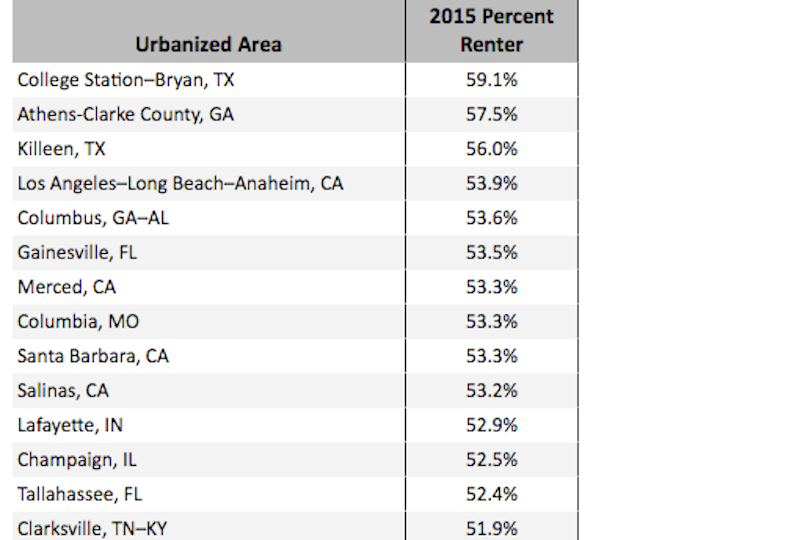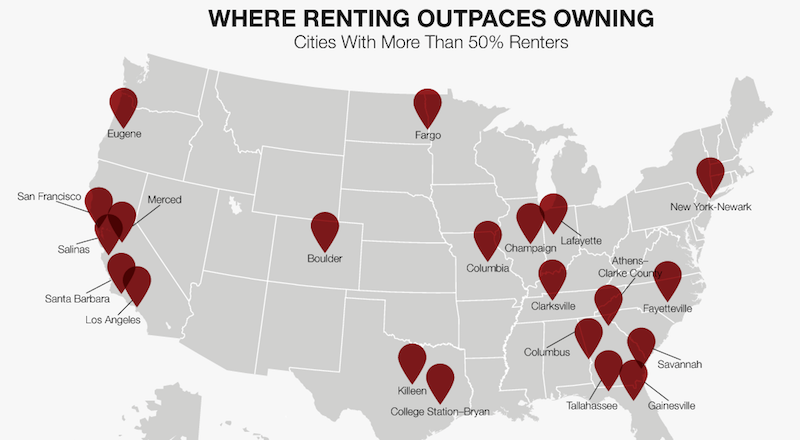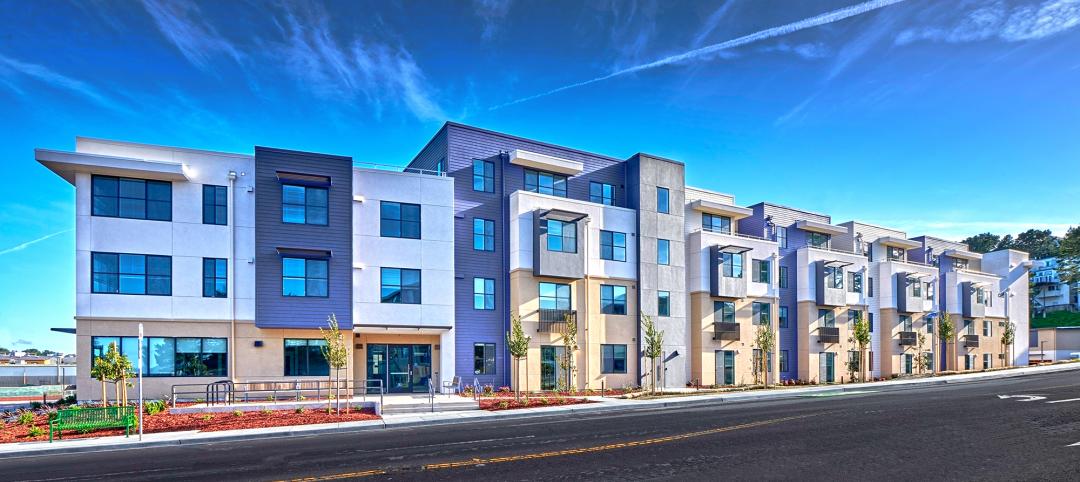Quick quiz: Which city has the highest percentage of renters: Chicago, Miami, or College Station, Texas? Believe it or not, it's College Station, with 59.1% renters. Chicago and Miami are both predominantly homeowner cities. Chicago has only 36.1% renters, Miami, 41.49%.
Of more than 400 urbanized areas around the country with a population greater than 100,000, just 21 are composed of at least 50% renters, according to data from the U.S. Census Bureau's 2015 American Community Survey. The full report was compiled by ADOBO and is based on data from The U.S. Census Bureau’s 2015 American Community Survey about occupied housing units in Urbanized Areas with a population of at least 100,000.
Not far behind is Athens-Clarke County, GA, with 57.5%, and Killeen, TX, with 56.0%. Other somewhat surprising cities include Columbus, GA (53.6%); Clarksville, TN (51.9%); Fayetteville, NC (51.2%); and Fargo, ND (50.2%). A number of big cities do make the list of majority rentals. Most housing units (53.9%) in the Los Angeles area are rented, not owned. The same goes for New York (50.7%) and San Francisco (50.9%). Five California cities make the list, more than any other state.
Many of the nation’s largest cities are unexpectedly absent from this list. Dallas, Houston, Washington, D.C., and Philadelphia are still dominated by homeowners. Both Dallas and Houston are hovering around the 43% renters' mark, while Washington, D.C., is 40.42% and Philadelphia is just 33.8% renters.
WHO'S RENTING, WHO OWNS A HOME?
A cursory glance at the age or renters hews to conventional wisdom, according to the ADOBO report. The majority of renters in the list of 21 renter-dominated cities are under 44 years old, with the highest percentage (24.29%) falling between the ages of 25 and 34. Owners tend to be older — 77.16% are over 45.
But a closer look at the age breakdown reveals some interesting divisions, especially on the renting side. In renter-dominated cities, the percentages are more equally spread across age groups for renting than for owning a home. Although over 50% of renters are 15 to 44 in age, a sizable percentage are older: 18.62% are 45 to 54, and another 14.13% are 55 to 64. A higher percentage of renters are 65 to 74 (8.32%) or 75-plus (6.96%) than 15 to 24 (5.9%).
These are all demographic factors that developers of rental apartments and condominiums - and their design and construction teams - need to keep in mind as they pursue future multifamily projects.

Related Stories
Multifamily Housing | Jan 12, 2023
8 noteworthy multifamily housing projects, including a refuge for unsheltered youth
Join us on a nationwide tour of notable new multifamily projects from around the country.
Senior Living Design | Jan 10, 2023
8 senior living communities that provide residents with memory care
Here are eight senior living communities that offer their residents memory care, an important service for residents who need this specialized care.
Government Buildings | Jan 9, 2023
Blackstone, Starwood among real estate giants urging President Biden to repurpose unused federal office space for housing
The Real Estate Roundtable, a group including major real estate firms such as Brookfield Properties, Blackstone, Empire State Realty Trust, Starwood Capital, as well as multiple major banks and CRE professional organizations, recently sent a letter to President Joe Biden on the implications of remote work within the federal government.
Multifamily Housing | Jan 9, 2023
New York City advances plan to build 500,000 new housing units
After New York Mayor Eric Adams announced a “Moonshot” plan to build 500,000 new housing units over the next 10 years in early December, he moved quickly to jumpstart the process.
Sustainability | Jan 9, 2023
Innovative solutions emerge to address New York’s new greenhouse gas law
New York City’s Local Law 97, an ambitious climate plan that includes fines for owners of large buildings that don’t significantly reduce carbon emissions, has spawned innovations to address the law’s provisions.
Fire and Life Safety | Jan 9, 2023
Why lithium-ion batteries pose fire safety concerns for buildings
Lithium-ion batteries have become the dominant technology in phones, laptops, scooters, electric bikes, electric vehicles, and large-scale battery energy storage facilities. Here’s what you need to know about the fire safety concerns they pose for building owners and occupants.
Multifamily Housing | Dec 29, 2022
San Jose is largest U.S. city to abolish minimum parking for new housing
San Jose, Calif., recently became the largest U.S. city to strike down minimum parking requirements for new housing development. The city reversed zoning devised in the 1950s that reputedly gave it the worst sprawl of parking space in northern California.
Codes and Standards | Dec 29, 2022
New York City multifamily owners concerned over fires caused by e-bikes
In 2022, there have been nearly 200 fires and six deaths in New York City caused by lithium-ion batteries used in mobility devices such as electric bikes and scooters.
Multifamily Housing | Dec 27, 2022
Traverse Apartments brings 281 sorely needed rental units to the Denver area
Traverse Apartments offers 281 units, designed by KTGY, is located in Lakewood, Colo.
Multifamily Housing | Dec 21, 2022
Bay Area school district builds 122 affordable apartments for faculty and staff
The 122 affordable apartments at 705 Serramonte, Daly City, Calif., were set aside not for faculty and staff at Jefferson Union High School District.

















